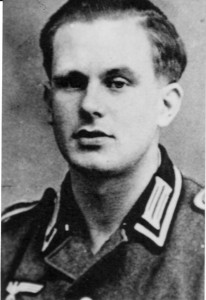The search for missing U.S. infantrymen usually involves searching ground taken by German units and held for a long period. Long enough to allow the new comers to bury American remains in unmarked graves, long enough for a raging battle to erase signs of fresh graves or simply long enough for wild animals to scatter human remains.
Such a battleground also contains lost and abandoned combat equipment as well as personal belongings. The latter can be campaign mementos or pieces of home, little items carried at the bottom of a pocket. In some instances, these items display evidence of a tragic end, but most were lost, abandoned or discarded by their former owners.
As an introduction to the following display of German artifacts recovered over the years along the Elsenborn Ridge is the witness account of Unteroffizier Karl Heinz Francke, squad leader in the 3rd Kompanie, Grenadier Regiment 991 of the 277th Volksgrenadier Division.
 Elsenborn Ridge – late December 1944.
Elsenborn Ridge – late December 1944.
… I pulled an old shelter half over my foxhole and lit a candle stump that I scrounged from my pants pocket. I then shoved my bayonet into the side of my shelter and stuck the lit candle on the handle. From my jacket pocket I carefully removed a crumpled Feldpost letter from my mother. « My dear son, » she wrote. « We are very sad that you could not spend Christmas with us this year. The New Year is at the door and we hope. . . » A huge explosion nearby caused me to draw together. The concussion tore away my shelter half and blew out the candle. I quickly put my letter in my breast pocket and pressed myself against the sides and bottom of my hole. More shells caused the ground to shake. They tore up the earth and changed the beautiful snow-covered fairyland forest into a chaos of blackened stumps. I tried to pray, but was unable to grasp clear thoughts. I could only press myself tighter to the earth. Suddenly it was again quiet. My fears were momentarily forgotten. My heart was beating in my throat, I knew what was coming. The enemy was attacking! I grabbed my assault rifle, stood up and stared into the dark of night. I endeavored to make contact with my comrades to the right and left when – with a poof – a flare went up. I stared intently to the front, to the edge of the forest. There, in the fluttering light of the flare, I saw them coming toward us from the forest edge. It was a combat patrol.
Soon came the unpleasant bark of machine pistols and the heavy crack of American rifles. Shells tore apart the trunks of the few undamaged trees still standing. My squad was now wide awake. Our assault rifles were up . . . burst, burst, shot, shot… and the cries of wounded. Following the sound of a flare gun, a red and green star-cluster signal flare burned for a few seconds in the night sky. It was the signal for our « heavy weapons. » Their « blessing » was forthcoming. Heavy shells rushed over us and crashed into the edge of the forest within the ranks of our attackers.
The enemy assault wave was stopped and broke down. Before withdrawing, some of the assault forces found concealment among the tangle of branches at the forest edge. It was over. The attack was wiped out. Two of our men trudged in the rear with first-aid bandages on; otherwise, we had no casualties.
It began to snow again. Soon thick flakes mercifully covered the wrecked forest. I cowered in my hole. My shelter half was gone. I remembered my mother’s letter and the parcel with which it came. I loosened the chin strap on my helmet and leaned back against the wall of my hole. From the deformed package, I fished out some of my mother’s cinnamon star cookies. They were a bit hard, but tasted better than ever.
My thoughts drifted far away to a comfortable heated living room filled with the fragrance of resin from a lighted Christmas tree. I could almost smell the odor of burning wax candies. I was at home in my parents’ house. I believed I could hear the church bells of my home town and the tower trumpets. « Peace on earth and good will toward men. »
























